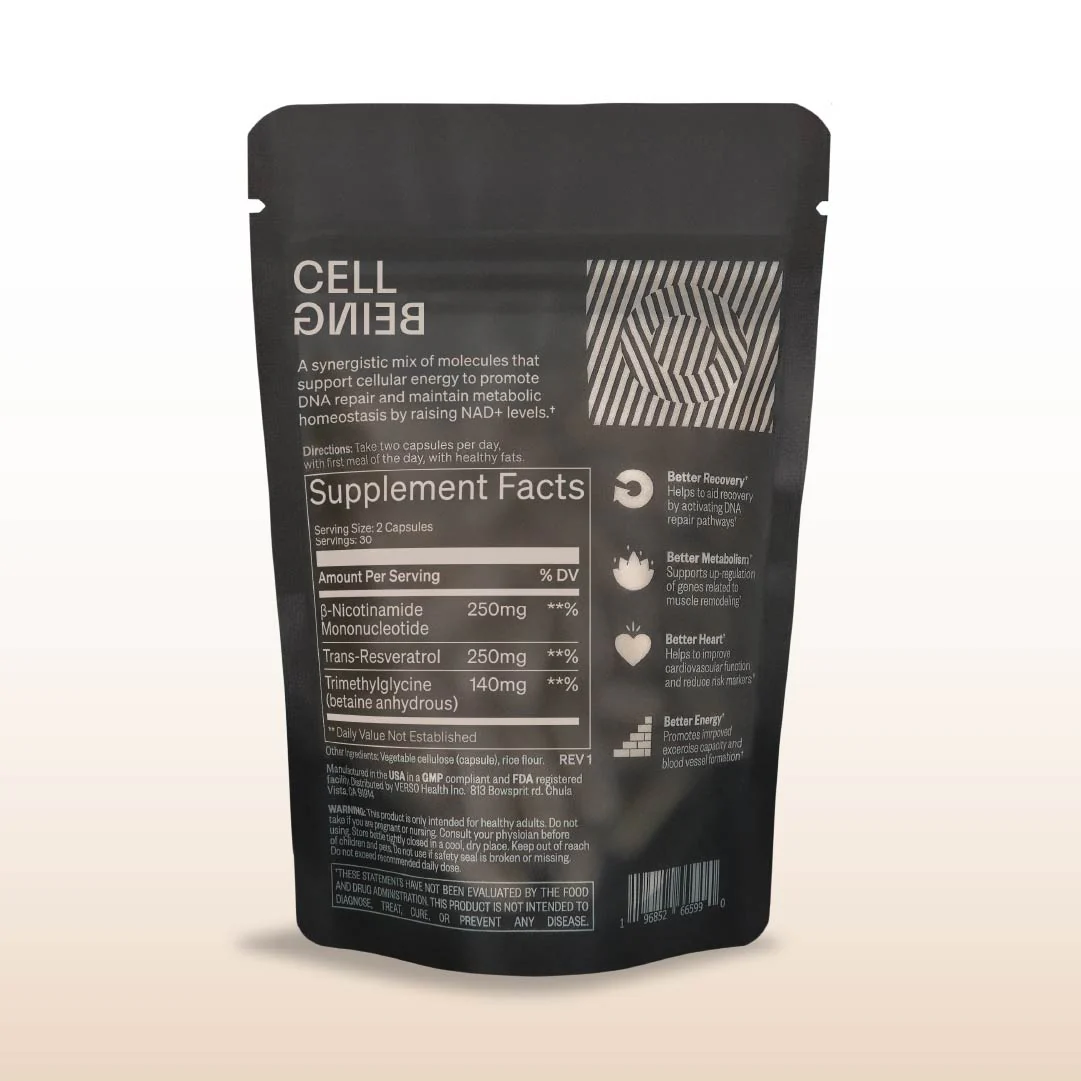
How VERSO’s Clean Being mimics the benefits of fasting
Since 2012 when intermittent fasting (IF) was widely popularized in the media, there have been countless clinical trials performed thus far investigating its efficacy and potential benefits [1]. Over the years, research has consistently reaffirmed that IF possesses great potential for weight loss and improved overall health with significantly low risk for developing any major side effects.
However, even though research studies have been able to repeatedly observe positive results in patients who adhere to an intermittent fasting eating schedule, that doesn’t necessarily mean that it’s a good fit for everyone. Although no serious or life-threatening side effects are likely to arise, there’s still a risk of developing minor side effects, such as hunger, fatigue, insomnia, irritability, decreased concentration, nausea, constipation, and headaches [2].
Furthermore, well-regarded medical professionals, such as Dr. Peter Attia, have documented cases where people who lost weight from intermittent fasting didn’t actually shed large amounts of fat as a result of decreased calorie intake, but rather, their weight loss was mostly the byproduct of losing lean muscle mass from insufficient protein intake.
None of these side effects will cause any amounts of long-lasting harm, but they will certainly be unenjoyable to endure in the moment. IF requires a massive amount of commitment that can force people to alter their lifestyle to a degree that’s rather inconvenient or all-around unpleasant.
At VERSO, we don’t think that the downsides of IF should hold people back from experiencing all of its life-improving perks. So, we formulated Clean Being – a strategic blend of molecules that mimic the effects of fasting, allowing people to reap the benefits without having to abstain from food.
What is IF and what are its benefits?
The most common IF eating schedule involves fasting for 18 consecutive hours per 24-hour period (including hours spent sleeping), which allows for a 6-hour eating window each day [3]. Sometimes, this schedule is adjusted to 16- or 14-hour periods of fasting so that there can be a larger window available for eating [4]. In the end, following this type of eating structure yields significant improvements to cellular autophagy and apoptosis, which can then work to increase fat loss, optimize muscle function, improve cognition, and extend lifespans [5], [6].
This is because, by having these extended periods of time where people don’t consume any food, our metabolism will switch its primary source of fuel from glucose to fatty acids [6]. When we eat throughout the day, the glucose in our food is processed into energy via a pathway called glycolysis. Whatever remaining amount of glucose that’s not immediately necessary for the body to burn is then stored as fat through a pathway called fatty acid synthesis [3], [6], [7].
What makes IF special is how it temporarily halts glycolysis during those periods of fasting, which then forces the metabolism to find another source of fuel for the body to continue functioning. When there’s no more glucose available to push glycolysis forward, the metabolism begins to primarily utilize the fatty acid oxidation pathway (FAO) to break down our stores of fat for fuel [1], [3], [6], [7], [8], [9].
In the absence of glucose and insulin when someone is in a fasting state, our metabolism begins to upregulate fatty acid oxidation. It’s because of this metabolic switch that intermittent fasting is able to yield such profound effects on health by improving the efficacy of autophagy and apoptosis in our cells [3], [5], [6], [7], [8].
Importance of autophagy
Autophagy is the body’s natural process of cleaning out old and degrading components in the cell. Whatever parts that are salvageable will be recycled, and everything else will be discarded as waste. The reason this is such a critical process in cellular health is two-fold:
- Recycling all the parts that are reusable will optimize the cell’s ability to synthesize new molecules, proteins, and organelles.
- Discarding all the waste will prevent the buildup of dead or dying cell-parts, which would otherwise burden the cell’s ability to function efficiently and survive [10].
Now, how does autophagy work? Well, autophagy is actually just an umbrella term used to describe the various pathways that carry out these jobs described above. Out of the many autophagic mechanisms that exist, three of the most relevant ones in this conversation are mediated by compounds known as mTOR, AMPK, and SIRT1 [8], [11], [12], [13].
mTOR, AMPK, and SIRT1
The mTOR pathway is intricately tethered to our metabolism’s rate of glycolysis and insulin release. When we eat, insulin release is increased in order to upregulate glycolysis and fatty acid synthesis. Conversely, when we fast, insulin is no longer being secreted into the bloodstream, which then downregulates the mTOR pathway. Researchers have been able to repeatedly observe that downregulation of the mTOR pathway during fasting plays an active role in boosting cellular capabilities of autophagy [8], [12], [14], [15], [16], [17], [18], [19], [20], [21].
The AMPK pathway, on the other hand, needs to be upregulated in order to promote cellular autophagy. AMPK primarily plays its role by activating a specific enzyme called Ulk1, which is critical for initiating the production of autophagosomes, the actual molecule that carries out autophagy [22], [23], [24], [25].
Lastly, SIRT1 is a particularly interesting moderator of autophagy because of its ability to simultaneously downregulate the mTOR pathway and upregulate the AMPK pathway [26], [27], [28]. [29], [30], [31]. It’s even possible for SIRT1 to directly induce autophagy by interacting with specific autophagy-related genes in our DNA [13].
Importance of apoptosis
While autophagy works to maintain and improve cellular functionality, lifespan, and overall health, apoptosis is the mechanism that programs cell death. No matter what, all cells must eventually die, so it’s critical that our bodies are capable of determining when to kill a cell before its declining performance becomes a liability, and then clearing out the dead cells so that they don’t accumulate and cause more harm [32], [33].
Once a cell begins to reach the end of its lifecycle, it’s at an increased risk of miscoding its DNA in a way that might cause cancer or other diseases, so these cells must be killed by apoptosis in order to prevent that. Furthermore, if cells aren’t properly disposed of once they die, they can accumulate into harmful or cancerous masses as well.
Apoptosis, similar to autophagy, is also an umbrella term encompassing the many different pathways that partake in programming cell death. The primary apoptotic pathways that are activated during intermittent fasting are controlled by caspases and p53 proteins [33], [34], [35], [36].
Caspases and P53
Caspases are a class of proteins called proteases, and they are quintessential in cell development and cell death. Multiple studies demonstrated that, when a subject is fasting, caspase 3, 8, and 9 activity is increased, which then contributed towards boosting levels of apoptosis [37]. Similarly, when treating fasting subjects with ghrelin, a gastrointestinal enzyme released during digestion, caspase-3 activity decreased alongside rates of apoptosis [38]. Therefore, we can use this correlation to infer that caspase-3 activity will increase when digestion is halted via fasting, leading to an increase in apoptosis.
P53, also known as tumor protein 53, primarily triggers apoptosis indirectly by altering transcriptional expression in a plethora of different genes. Tumor protein 53 can both increase the transcription of apoptotic genes, and decrease the transcription of anti-apoptotic genes. When p53 inhibits the expression of anti-apoptotic genes, such as survivin, caspase activity increases, and when observing individuals that are fasting, levels of p53 activation and apoptosis have both been shown to significantly increase, as well [39], [40], [41], [42], [43], [44].
How VERSO’s Clean Being mimics IF by activating these same pathways – without fasting!
We formulated Clean Being to activate your body’s natural clean up mechanisms, killing off old, damaged cells that could potentially turn into cancer cells and other diseases. Research has found 3 specific compounds that stand out as key supporters of autophagy and apoptosis so that cellular life can be preserved and extended: spermidine, luteolin, and dihydroquercetin.
Spermidine
Spermidine occurs naturally in mammalian cells for the purpose of supporting cellular growth, proliferation, and regeneration, but even though it’s always present in our bodies, it declines steadily as we age. However, by increasing spermidine concentrations through oral supplementation, research shows that autophagy is significantly boosted by upregulating the AMPK pathway and downregulating the mTOR pathway [45], [46], [47], [48], [49].
This shows how the primary pathway that intermittent fasting targets for the sake of improving autophagy can be effectively replicated through spermidine supplementation without needing to fast. Furthermore, several research studies observed spermidine to be capable of protecting against age-related disorders, such as neurodegeneration and cardiovascular disease [45], [50], [51], [52].
Spermidine has also been shown to decrease cancer and cardiovascular related incidences of mortality, increase mitochondrial biogenesis, and improve immunomodulatory capabilities of the human body, all of which effectively work to extend the lifespans of those who chronically supplement with spermidine [53].
Luteolin
Whereas spermidine focusses on targeting autophagic pathways, luteolin primarily acts as an anti-proliferation compound, meaning that it activates apoptotic pathways that prevent and fight against cancer. As mentioned earlier, following an intermittent fasting diet has been associated with lower rates of cancer secondary to the increased activation of caspases, increased expression of p53, and decreased activation of mTOR. Clinical evidence also shows that supplementation with luteolin yields these same changes, which then upregulates apoptosis without needing to restrict calories through fasting [54], [55], [56], [57], [58], [59], [60].
In addition to luteolin’s role in apoptosis, it can also provide antioxidant, cardioprotective, and neuroprotective benefits similar to those of spermidine. As a result, these qualities have helped luteolin emerge as a promising treatment method for COVID and several of COVID’s lasting side effects [61], [62], [63], [64], [65], [66], [67].
This shows how the primary pathway that intermittent fasting targets for the sake of improving autophagy can be effectively replicated through spermidine supplementation without needing to fast. Furthermore, several research studies observed spermidine to be capable of protecting against age-related disorders, such as neurodegeneration and cardiovascular disease [45], [50], [51], [52].
Spermidine has also been shown to decrease cancer and cardiovascular related incidences of mortality, increase mitochondrial biogenesis, and improve immunomodulatory capabilities of the human body, all of which effectively work to extend the lifespans of those who chronically supplement with spermidine [53].
Dihydroquercetin
Lastly, dihydroquercetin functions as an antioxidant compound, which allows it to impact both autophagy and apoptosis. The purpose of an anti-oxidant compound is to protect against reactive oxygen species (ROS) because they can damage DNA, proteins, and lipids. If a cell incurs enough damage from ROS, the cell will die [68].
Several studies looking into dihydroquercetin’s antioxidant characteristics have shown that it possesses powerful protective properties against disease by boosting autophagy and preventing apoptosis in cases where cell death would be notably harmful. Researchers found that cardiovascular disease, liver disease, and traumatic brain injuries can all be treated through the inhibition of apoptosis and promotion of autophagy. Together, these two changes are able to synergistically preserve cellular life, and prevent premature cellular death from an overabundance of oxidative stress [68], [69], [70], [71], [72].
Why Clean Being is superior to intermittent and prolonged fasting
Although there’s no doubt that intermittent fasting has the potential to improve health and longevity, it doesn’t come without potential downsides that can negatively impact one’s day-to-day life. It’s also important to note that 3-4 days of fasting is usually required to most significantly stimulate autophagy [73]. Clean Being, on the other hand, is formulated with key ingredients that act as mimetics and have been clinically shown in a plethora of different studies to effectively stimulate the same biochemical pathways as fasting while simultaneously protecting our cardiac and neurologic systems from age-related disorders.
Intermittent fasting was originally seen as the most viable option for people to optimize their metabolism, while boosting overall health and work productivity. IF has improved so many people’s lives since its popularization in 2012, but the fact of the matter is this: Clean Being stimulates the exact same mechanisms as IF with next to zero effort on your part, making it the clear winner between the two when it comes to optimizing health in the easiest, most efficient way possible.

Author: Ethan Iles
Ethan is a medical student at the Chicago Medical School of Rosalind Franklin University. Upon graduating, he plans on practicing medicine as an emergency physician with a specialty in public health.
Works Cited
- Janaswamy R, Yelne P. A Narrative Review on Intermittent Fasting as an Approachable Measure for Weight Reduction and Obesity Management. Cureus. 2022;14(10):e30372. Doi: 10.7759/cureus.30372.
- https://www.mayoclinichealthsystem.org/hometown-health/speaking-of-health/intermittent-fasting-fad-or-solution#:~:text=Intermittent%20fasting%20can%20have%20unpleasant,go%20away%20within%20a%20month.
- Vasim I, Majeed CN, DeBoer MD. Intermittent Fasting and Metabolic Health. Nutrients. 2022;14(3):631. Doi: 10.3390/nu1403063.
- https://www.healthline.com/nutrition/6-ways-to-do-intermittent-fasting
- Golbidi S, Daiber A, Korac B et al. Health Benefits of Fasting and Caloric Restriction. Curr Diab Rep 2017;17, 123. Doi: 10.1007/s11892-017-0951-7.
- Anton SD, Moehl K, Donahoo WT et al. Flipping the metabolic switch: Understanding and applying the health benefits of fasting. Obesity, 1028;26(2), 254–268. Doi: 10.1002/oby.22065.
- Kersten S. The impact of fasting on adipose tissue metabolism. Biochim. Biophys. Acta Mol. Cell Biol. of Lipids, 1868(3). Doi: 10.1016/j.bbalip.2022.159262.
- Longo V, Mattson MP. Fasting: Molecular Mechanisms and Clinical Applications. Cell Metabolism 2014;19, 181-192. Doi: 10.1016/j.cmet.2013.12.008.
- Dhillon KK, Gupta S. Biochemistry, Ketogenesis. [Updated 2023 Feb 6]. In: StatPearls [Internet]. Treasure Island (FL): StatPearls Publishing; 2023 Jan-. Available from: https://www.ncbi.nlm.nih.gov/books/NBK493179/#
- https://my.clevelandclinic.org/health/articles/24058-autophagy
- Ma YN, Jiang X, Tang W, Song P. Influence of intermittent fasting on autophagy in the liver. Biosci Trends 2023;17(5):335-355. Doi: 10.5582/bst.2023.01207.
- Alirezaei M, Kemball CC, Flynn CT et al. Short-term fasting induces profound neuronal autophagy. Autophagy 2010 6:6, 702-710. Doi: 10.4161/auto.6.6.12376.
- Kitada M, Ogura Y, Koya D. Role of Sirt1 as a regulator of autophagy. Autophagy 2016 8, 89-100. Doi: 10.1016/B978-0-12-802937-4.00003-X.
- Harvie MN, Pegington M, Mattson MP, et al. The effects of intermittent or continuous energy restriction on weight loss and metabolic disease risk markers: a randomized trial in young overweight women. Int J Obes (Lond). 2011;35(5):714-727. Doi: 10.1038/ijo.2010.171.
- Dunlop EA, Tee AR. MTOR and autophagy: A dynamic relationship governed by nutrients and energy. Semin. Cell Dev. Biol. 2014;36:121-129.
- Sengupta S, Peterson TR, Laplante M, Oh S, Sabatini DM. mTORC1 controls fasting-induced ketogenesis and its modulation by ageing. Nature. 2010;468(7327):1100-1104. Doi:10.1038/nature09584.
- van Niekerk G, Hattingh SM, Engelbrecht AM. Enhanced Therapeutic Efficacy in Cancer Patients by Short-term Fasting: The Autophagy Connection. Front. Oncol. 2016;6:242. Doi: 10.3389/fonc.2016.00242.
- Jung CH, Ro SH, Cao J, Otto NM, Kim DH. mTOR regulation of autophagy. FEBS Lett. 2010;584:1287-1295. Doi: 10.1016/j.febslet.2010.01.017.
- Wang Y, Zhang H. Regulation of Autophagy by mTOR Signaling Pathway. Autophagy: Biology and Diseases. Advances in Experimental Medicine and Biology. 2019;1206:67-83. Doi: 10.1007/978-981-15-0602-4_3.
- Kim J, Kundu M, Viollet B et al. AMPK and mTOR regulate autophagy through direct phosphorylation of Ulk1. Nat Cell Biol. 2011;13:132–141. Doi: 10.1038/ncb2152.
- Nicklin P, Bergman P, Zhang B et al. Bidirectional Transport of Amino Acids Regulates mTOR and Autophagy. Cell. 2009;136(3):521-524. Doi: 10.1016/j.cell.2008.11.044.
- Li Y, Chen Y. AMPK and Autophagy. Autophagy: Biology and Diseases. Advances in Experimental Medicine and Biology. 2019;1206:85-108. Doi: 10.1007/978-981-15-0602-4_4.
- Wang S, Li H, Yuan M, Fan H and Cai Z. Role of AMPK in autophagy. Front. Physiol. 2022;13 Doi: 10.3389/fphys.2022.1015500.
- Wong PM, Puente C, Ganley IG, Jiang X. The ULK1 complex: sensing nutrient signals for autophagy activation. Autophagy. 2013;9(2):124-137. Doi: 10.4161/auto.23323.
- Lin MG, Hurley JH. Structure and function of the ULK1 complex in autophagy. Curr Opin Cell Biol. 2016;39:61-68. Doi: 10.1016/j.ceb.2016.02.010.
- Ghosh HS, McBurney M, Robbins PD. SIRT1 negatively regulates the mammalian target of rapamycin. PLoS One. 2010;5(2):e9199. Doi: 10.1371/journal.pone.0009199.
- Price NL, Gomes AP, Ling AJ, et al. SIRT1 is required for AMPK activation and the beneficial effects on mitochondrial function. Cell Metab. 2012;15(5):675-690. Doi: 10.1016/j.cmet.2012.04.003.
- Ruderman NB, Xu XJ, Nelson L, et al. AMPK and SIRT1: a long-standing partnership?. Am J Physiol Endocrinol Metab. 2010;298(4):E751-E760. Doi: 10.1152/ajpendo.00745.2009.
- Shackelford DB, Shaw RJ. The LKB1-AMPK pathway: metabolism and growth control in tumour suppression. Nat Rev Cancer. 2009;9(8):563-575. Doi: 10.1038/nrc2676.
- Wu Y, Li X, Zhu JZ, Xie W et al.-Activated AMPK/SIRT1/Autophagy in Cellular Models of Parkinson’s Disease. Neurosignals 2011;19(3):163–174. Doi: 10.1159/000328516.
- Luo G, Jian Z, Zhu Y, Zhu Y, Chen B, Ma R, Tang F, Xiao Y. Sirt1 promotes autophagy and inhibits apoptosis to protect cardiomyocytes from hypoxic stress. Int J Mol Med. 2019;43(5):2033-2043. Doi: 10.3892/ijmm.2019.4125.
- Twomey C, McCarthy JV. Pathways of apoptosis and importance in development. J Cell and Mol Med. 2007;9(2):345-359. Doi: 10.1111/j.1582-4934.2005.tb00360.x.
- Reed J. Mechanisms of apoptosis. Am. J. Pathol. 2000;157(5):1415-1430.
- Zuckerman V, Wolyniec K, Sionov RV, Haupt S, Haupt Y. Tumour suppression by p53: the importance of apoptosis and cellular senescence. J Pathol. 2009;219(1):3-15. Doi: 10.1002/path.2584.
- Cohen G. Caspases: the executioners of apoptosis. Biochem J. 1997;326 (1):1-16. Doi: doi.org/10.1042/bj3260001.
- Haupt S, Berger M, Goldberg Z, Haupt Y. Apoptosis – the p53 network. J Cell Sci. 2003;116(20):4077-4085. Doi: 10.1242/jcs.00739.
- Fujise T, Iwakiri R, Wu B, et al. Apoptotic pathway in the rat small intestinal mucosa is different between fasting and ischemia-reperfusion. Am J Physiol Gastrointest Liver Physiol. 2006;291(1):G110-G116. Doi: 10.1152/ajpgi.00393.2005.
- Park JM, Kakimoto T, Kuroki T, et al. Suppression of Intestinal Mucosal Apoptosis by Ghrelin in Fasting Rats. Experimental Biology and Medicine. 2008;233(1):48-56. Doi: 10.3181/0706-RM-169.
- Amaral JD, Xavier JM, Steer CJ, Rodrigues CM. The Role of p53 in Apoptosis. Discovery Medicine. 2010;9(45):145-152.
- Schuler, D. R. Green; Mechanisms of p53-dependent apoptosis. Biochem Soc Trans. 2001;29(6):684–688. Doi: 10.1042/bst0290684.
- Bates, S., Vousden, K. Mechanisms of p53-mediated apoptosis. CMLS, Cell. Mol. Life Sci. 1999;55:28–37. Doi: 10.1007/s000180050267.
- Krstic J, Reinisch I, Schindlmaier K, et al. Fasting improves therapeutic response in hepatocellular carcinoma through p53-dependent metabolic synergism. Sci Adv. 2022;8(3):eabh2635. Doi: 10.1126/sciadv.abh2635.
- Tikoo K, Tripathi DN, Kabra DG et al. Intermittent fasting prevents the progression of type I diabetic nephropathy in rats and changes the expression of Sir2 and p53. FEBS Lett. 2007;581(5):1071-1078. Doi: 10.1016/j.febslet.2007.02.006.
- Reinisch I, Michenthaler H, Moyschewitz E, Krstic J. Adipocyte p53 Coordinates the Response to Cyclic Fasting by Regulating Adipose Tissue Immune Cell Landscape. Doi: 2139/ssrn.4425874.
- Yan J, Yan YJ, Wang YX et al. Spermidine-enhanced autophagic flux improves cardiac dysfunction following myocardial infarction by targeting the AMPK/mTOR signalling pathway. Brit J of Pharm. 2019;176(17):3126-3142. Doi: 10.1111/bph.14706.
- Morselli E, Galluzzi L, Kepp O, et al. Autophagy mediates pharmacological lifespan extension by spermidine. Aging (Albany NY). 2009;1(12):961-970. Doi: 10.18632/aging.100110.
- Morselli E, Marino G, Bennetzen MV, Eisenberg T et al. Spermidine induce autophagy by distinct pathways converging on the acetylproteome. J Cell Biol. 2011;192:615–629. Doi: 10.1083/jcb.201008167.
- Liu R, Li X, Ma H, Yang Q et al. Spermidine endows macrophages anti-inflammatory properties by inducing mitochondrial superoxide-dependent AMPK activation, Hif-1α upregulation and autophagy. Free Rad Biol Med. 2020;161:339-350. Doi: 10.1016/j.freeradbiomed.2020.10.029.
- Liu H, Dong J, Song S et al. Spermidine ameliorates liver ischaemia-reperfusion injury through the regulation of autophagy by the AMPK-mTOR-ULK1 signalling pathway. Biochem Biophys Res Commun. 2019;519(2):227-233. Doi: 10.1016/j.bbrc.2019.08.162.
- Hofer SJ, Simon AK, Bergmann M et al. Mechanisms of spermidine-induced autophagy and geroprotection. Nat Aging. 2022;2:1112-1129. Doi: 10.1038/s43587-022-00322-9.
- Gao M, Zhao W, Li C et al. Spermidine ameliorates non-alcoholic fatty liver disease through regulating lipid metabolism via AMPK. Biochem Biophys Res Commun. 2018;505(1):93-98. Doi: 10.1016/j.bbrc.2018.09.078.
- Xu TT, Li H, Dai Z, et al. Spermidine and spermine delay brain aging by inducing autophagy in SAMP8 mice. Aging (Albany NY). 2020;12(7):6401-6414. Doi: 10.18632/aging.103035.
- Madeo F, Eisenberg T, Pietrocola F, Kroemer G. Spermidine in health and disease. Science. 2018;359(6374). Doi: 10.1126/science.aan2788.
- Raina R, Pramodh S, Rais N et al. Luteolin inhibits proliferation, triggers apoptosis and modulates Akt/mTOR and MAP kinase pathways in HeLa cells. Oncol Lett. 2021;21(3). Doi: 10.3892/ol.2021.12452.
- Li J, Li X, Xu W, Wang S et al. Antifibrotic effects of luteolin on hepatic stellate cells and liver fibrosis by targeting AKT/mTOR/p70S6K and TGFβ/Smad signalling pathways. Liver Int. 2015;35(4):1222-1233. Doi: 10.1111/liv.12638.
- Iida K, Naiki T, Naiki-Ito A, et al. Luteolin suppresses bladder cancer growth via regulation of mechanistic target of rapamycin pathway. Cancer Sci. 2020;111(4):1165-1179. Doi: 10.1111/cas.14334.
- Yoo HS, Won SB, Kwon YH. Luteolin Induces Apoptosis and Autophagy in HCT116 Colon Cancer Cells via p53-Dependent Pathway. Nutrition and Cancer. 2022;74(2):677-686. Doi: 10.1080/01635581.2021.1903947.
- Shi R, Huang Q, Zhu X et al. Luteolin sensitizes the anticancer effect of cisplatin via c-Jun NH2-terminal kinase–mediated p53 phosphorylation and stabilization. Mol Cancer Ther.2007;6(4):1338-1347. Doi: 10.1158/1535-7163.MCT-06-0638.
- Im E, Yeo C, Lee Eo. Luteolin induces caspase-dependent apoptosis via inhibiting the AKT/osteopontin pathway in human hepatocellular carcinoma SK-Hep-1 cells. Life Sci. 2018;209:259-266. Doi: 10.1016/j.lfs.2018.08.025.
- Cho HJ, Ahn KC, Choi JY et al. Luteolin acts as a radiosensitizer in non‑small cell lung cancer cells by enhancing apoptotic cell death through activation of a p38/ROS/caspase cascade. Int J Oncol. 2015;46:1149-1158. Doi: 10.3892/ijo.2015.2831.
- Luo Y, Shang P, and Li D. Luteolin: A Flavonoid that Has Multiple Cardio-Protective Effects and Its Molecular Mechanisms. Front. Pharmacol. 2017;8:692. Doi: 10.3389/fphar.2017.00692.
- Manzoor MF, Ahmad N, Manzoor A, Kalsoom A. Food based phytochemical luteolin their derivatives, sources and medicinal benefits. International Journal of Agricultural and Life Sciences. 2017;3(2):195-207. Doi: 10.22573/spg.ijals.017.s12200084.
- Nabavi SF, Braidy N, Gortzi O, Sobarzo-Sanchez E. Luteolin as an anti-inflammatory and neuroprotective agent: A brief review. 2015;119:1-11. Doi: 10.1016/j.brainresbull.2015.09.002.
- Theoharides TC. COVID-19, pulmonary mast cells, cytokine storms, and beneficial actions of luteolin. Biofactors. 2020;46(3):306-308. doi:10.1002/biof.1633.
- Wang W, Yang C, Xia J et al. Luteolin is a potential inhibitor of COVID-19: An in silico analysis. Medicine. 2023;102(38):p e35029. Doi: 10.1097/MD.0000000000035029.
- Xie YZ, Peng CW, Su ZQ, Huang HT et al. A Practical Strategy for Exploring the Pharmacological Mechanism of Luteolin Against COVID-19/Asthma Comorbidity: Findings of System Pharmacology and Bioinformatics Analysis. Front. Immunol. 2022;12:769011. Doi: 10.3389/fimmu.2021.769011.
- Zhu J, Yan H, Shi M et al. Luteolin inhibits spike protein of severe acute respiratory syndrome coronavirus-2 (SARS-CoV-2) binding to angiotensin-converting enzyme 2. Phytotherapy Research. 2023;37(8):3508-3521. Doi: 10.1002/ptr.7826.
- Zhang Y, Yu J, Dong X-D, Ji H-Y. Research on Characteristics, Antioxidant and Antitumor Activities of Dihydroquercetin and Its Complexes. Molecules. 2018;23(1):20. Doi: 10.3390/molecules23010020.
- Vladimirov YA, Proskurnina EV, Demin EM et al. Dihydroquercetin (taxifolin) and other flavonoids as inhibitors of free radical formation at key stages of apoptosis. Biochemistry Moscow 2009;74:301-307. Doi: 10.1134/S0006297909030092.
- Shu Z, Yang Y, Yang L et al. Cardioprotective effects of dihydroquercetin against ischemia reperfusion injury by inhibiting oxidative stress and endoplasmic reticulum stress-induced apoptosis via the PI3K/Akt pathway. Food Funct. 2019;10:203-215. Doi: 10.1039/C8FO01256C.
- Du G, Zhao Z, Chen Y et al. Quercetin attenuates neuronal autophagy and apoptosis in rat traumatic brain injury model via activation of PI3K/Akt signaling pathway. Neurol Res. 2016;38(11):1012-1019. Doi: 10.1080/01616412.2016.1240393.
- Zai W, Chen W, Luan J et al. Dihydroquercetin ameliorated acetaminophen-induced hepatic cytotoxicity via activating JAK2/STAT3 pathway and autophagy. Appl Microbiol Biotechnol. 2018;102:1443-1453. Doi: 10.1007/s00253-017-8686-6.
- https://www.foundmyfitness.com/episodes/guido-kroemer
Try Us







